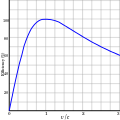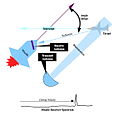The Rocketry Portal

A rocket (from Italian: rocchetto, lit. 'bobbin/spool') is a vehicle that uses jet propulsion to accelerate without using any surrounding air. A rocket engine produces thrust by reaction to exhaust expelled at high speed. Rocket engines work entirely from propellant carried within the vehicle; therefore a rocket can fly in the vacuum of space. Rockets work more efficiently in a vacuum and incur a loss of thrust due to the opposing pressure of the atmosphere.
Multistage rockets are capable of attaining escape velocity from Earth and therefore can achieve unlimited maximum altitude. Compared with airbreathing engines, rockets are lightweight and powerful and capable of generating large accelerations. To control their flight, rockets rely on momentum, airfoils, auxiliary reaction engines, gimballed thrust, momentum wheels, deflection of the exhaust stream, propellant flow, spin, or gravity.
Rockets for military and recreational uses date back to at least 13th-century China. Significant scientific, interplanetary and industrial use did not occur until the 20th century, when rocketry was the enabling technology for the Space Age, including setting foot on the Moon. Rockets are now used for fireworks, missiles and other weaponry, ejection seats, launch vehicles for artificial satellites, human spaceflight, and space exploration.
Chemical rockets are the most common type of high power rocket, typically creating a high speed exhaust by the combustion of fuel with an oxidizer. The stored propellant can be a simple pressurized gas or a single liquid fuel that disassociates in the presence of a catalyst (monopropellant), two liquids that spontaneously react on contact (hypergolic propellants), two liquids that must be ignited to react (like kerosene (RP1) and liquid oxygen, used in most liquid-propellant rockets), a solid combination of fuel with oxidizer (solid fuel), or solid fuel with liquid or gaseous oxidizer (hybrid propellant system). Chemical rockets store a large amount of energy in an easily released form, and can be very dangerous. However, careful design, testing, construction and use minimizes risks. (Full article...)
Selected article -
In the news
- 9 July 2024 – Israel–Hamas war
- Hezbollah launches dozens of rockets at the Israeli-occupied Golan Heights in Syria, killing two Israelis. (The Jerusalem Post)
- 4 July 2024 – Israel–Hezbollah conflict
- Hezbollah launches at least 200 rockets and a swarm of drones at Israeli territory and threatens to expand its targeting range, in retaliation for the killing of Mohammed Nasser, a top Hezbollah commander. (Reuters)
- 3 July 2024 – Israel–Hezbollah conflict
- Hezbollah launches a barrage of at least 100 Katyusha rockets, towards northern Israel, targeting Israeli military positions, in retaliation for the killing of Nasser. (Al Jazeera)
- 30 June 2024 –
- A Chinese Tianlong-3 rocket stage is accidentally launched during a static fire test in Gongyi, Henan, China, causing it to crash and explode. No casualties are reported. (CNN)
- 13 June 2024 – Israel–Hamas war
- Hezbollah launches more than 200 rockets at northern Israel. In response, Israeli artillery strikes targets in Yaroun, Hanine, and Yater in southern Lebanon. (The New York Times)
Topics
List articles
Things to do
 |
Here are some tasks awaiting attention:
|
Wikimedia
The following Wikimedia Foundation sister projects provide more on this subject:
-
 Commons
Commons
Free media repository -
 Wikibooks
Wikibooks
Free textbooks and manuals -
 Wikidata
Wikidata
Free knowledge base -
 Wikinews
Wikinews
Free-content news -
 Wikiquote
Wikiquote
Collection of quotations -
 Wikisource
Wikisource
Free-content library -
 Wikispecies
Wikispecies
Directory of species -
 Wikiversity
Wikiversity
Free learning tools -
 Wikivoyage
Wikivoyage
Free travel guide -
 Wiktionary
Wiktionary
Dictionary and thesaurus
-

-

-

-

-
Random portal
Purge server cache







































Recent Comments